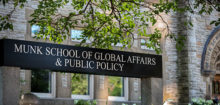To members of the Munk School community,
In recent weeks, the murder of George Floyd has ignited protests around the world. Systemic racism is a lived reality for Black Canadians with devastating consequences for individuals, families and communities. Systemic racism is also a lived reality for Indigenous peoples and people of colour in Canada and other countries. In all its forms, racism is unjust and it is wrong. We all have a role to play in confronting these inequities and in working to build more just societies.
Last week, I echoed support for President Gertler’s statement and spoke to our graduating classes about the need to take this moment to change things for the better. I am heartened by the work being done by our student associations and by so many students, alumni, faculty and staff in our community to work towards racial justice and to build more inclusive societies. We all need to lift our voices against racism and inequity.
A commitment to positive change also requires us to look inward. We recognize the complexity and deep-seated nature of this problem, which itself requires multiple voices and perspectives. In recent days, I have been in discussion with some of you about how the Munk School community can work to address these issues within our own sphere. We need to collaborate together. And we need to act in concrete ways.
As an academic community, we need to create spaces to encourage discussion. We need to listen and learn. Because that is the best and only basis for action. To begin this, I am outlining some specific steps I want us to take as a community:
- Global Affairs and Public Policy schools grapple with some of the world’s most difficult and complex problems. Continuing discrimination, racism, and arbitrary state violence are very pressing concerns. To open a space for listening, partnership and collaboration, we will create an anti-racism action table — composed of current students, alumni, staff and faculty to develop ideas and assist with the implementation of initiatives on anti-Black racism, the pernicious effects of racism in all its forms, and diversity. I intend to participate personally at this table. We will also reach out and obtain advice from experts in the City of Toronto and learn from the University’s Anti-Racism and Cultural Diversity Office.
- We commit to spotlighting and generating much-needed discussion and work on this issue. We will inaugurate and organize a new speaker series, in the Munk School, that is focused on issues of racism and systemic discrimination. Our plan is for this series to direct our attention to these pressing problems, and through this series to insist on an ongoing conversation in the Munk School on racism, discrimination, and diversity.
- As a school, we work to equip tomorrow’s leaders with the skills they need to make social change in their professional lives. Part of this training must include ways to understand and address systems that work to exclude, marginalize and oppress. Accordingly, we will expand resources within our professional development training to equip our students with the understanding and tools they need to address racism and discrimination in their professional lives. We will also be making these resources available to faculty and staff in the Munk School, to augment the training they receive in how to challenge unconscious bias.
- We will amplify the work being done at the Munk School to uncover and examine racial inequality and systemic discrimination. We will continue to support student leadership initiatives such as the Equity, Diversity and Public Policy Initiative, the Indigenous Affairs Student Initiative and Spectrum. Through these initiatives, and through forums such as the Harvard Black Policy Conference, MPP and MGA students work to learn about and challenge systemic discrimination, homophobia, racism and inequality, and their impact on policymaking.
- The Munk School hosted the first-ever Toronto Black Policy Conference, organized by three MPP alumni (Anna-Kay Russell, Eunice Kays and Sharnelle Morgan), in collaboration with the Urban Policy Lab and the City of Toronto’s Confronting Anti-Black Racism Unit. We will continue to support the conference and future collaborations, working in concert with the Toronto Black Policy Network and other leaders on these issues.
- As part of our work charting the future of the School, we have decided this year to undertake a curriculum review of both the MPP and MGA programs at the Munk School. I will look for input from Munk School community members, as well as our action table, for insights on how we can better address issues of racial discrimination within our curriculum. In the current year, we are acting immediately by developing a second-year course on the reform of policing and the criminal justice system.
And most importantly: accountability. I will return to you and report back early in the fall term on the mandate and membership of the action table and other steps we are taking and will report back to you again at the outset of the winter term on the progress of these initiatives.
Learning is central. For those of you who want to learn more and to read more deeply on the subject now, the University of Toronto libraries have compiled an anti-Black racism reading list. I have attached this as a link here.
We recognize the urgency and complexity of the challenges before us. I am committed to working together with you to listen, to collaborate, and to act on them.
Michael Sabia
Originally Published on June 15, 2020.
